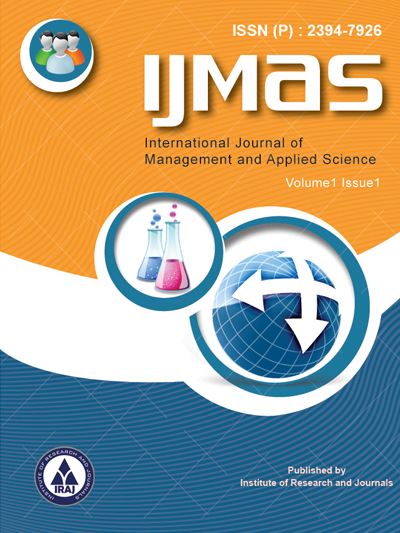Publish In |
International Journal of Management and Applied Science (IJMAS)-IJMAS |
 Journal Home Volume Issue |
||||||||
Issue |
Volume-6,Issue-1 ( Jan, 2020 ) | |||||||||
Paper Title |
Strengthening Social Responsibility among Children through Activity-based Modeling and Reinforcement | |||||||||
Author Name |
Komal Jain, Divya Palaniappan | |||||||||
Affilition |
Flinto Learning Solutions, India | |||||||||
Pages |
127-130 | |||||||||
Abstract |
Modeling prosocial behaviour among children is essential to enable them to combat today’s challenges. The ability of children to voluntarily act in a positive way will create a desirable social impact in solving persistent challenges such as water scarcity, plastic pollution, and climate change. Young children are receptive and through appropriate teaching methods we can imbibe autonomy-driven social responsibility in them. In this study, we aimed to inculcate social responsibility and empathy among children between 4-8 years through activity-based modeling and reinforcement. An activity to incentivise children’s prosocial behaviour of imbibing conservation in their daily lives was designed to mold them into responsible global citizens. It was based on the concepts of modeling from the theory of social learning (Bandura, 1969), schedules of reinforcement from operant conditioning (Skinner, 1937) and sense of autonomy from self-determination theory (Ryan and Decci, 2002) for habit formation. The activity was designed with the aim of developing a prosocial behaviour driven by a sense of autonomy among children that can create a positive social impact. Initially, to drive the habit of conservation, positive reinforcement is provided and as children succeed, self-autonomy drives their behaviour later on. According to the NITI Ayog (2019), 40% of the Indian population will have no access to drinking water by 2040. Children will play a vital role in combating the current water situation in India. Flinto’s Change Makers is a 21-day water savior challenge that focuses on habit formation of conscious water conservation among children. Guidelines adapted from UNESCO on how to conserve water is provided; children could choose and implement 6 out of the 10 conservation ideas provided to earn rewards. The child’s progress is monitored using a 21-day tracker with intermediate rewards to encourage the prosocial behaviour of conserving water. Behaviours that are repetitive and consistent can be automatized. The children are provided positive reinforcements in a fixed ratio interval schedule to form learned behaviours. During the process, parents are encouraged to act as role models as well; set an example by conserving water thereby modeling social responsibility. Parents are encouraged to provide choices, and encourage decision-making to enable autonomy which helps children stay motivated intrinsically. Children are encouraged to make informed choices in a supportive yet challenging environment as they advance in their activity. The activity helps in developing symbiotic relationships with oneself, others and the community as a whole, fostering social responsibility and empathy. Keywords - Social Responsibility, Positive Reinforcement, Habit Formation, Water Conservation | |||||||||
| View Paper | ||||||||||